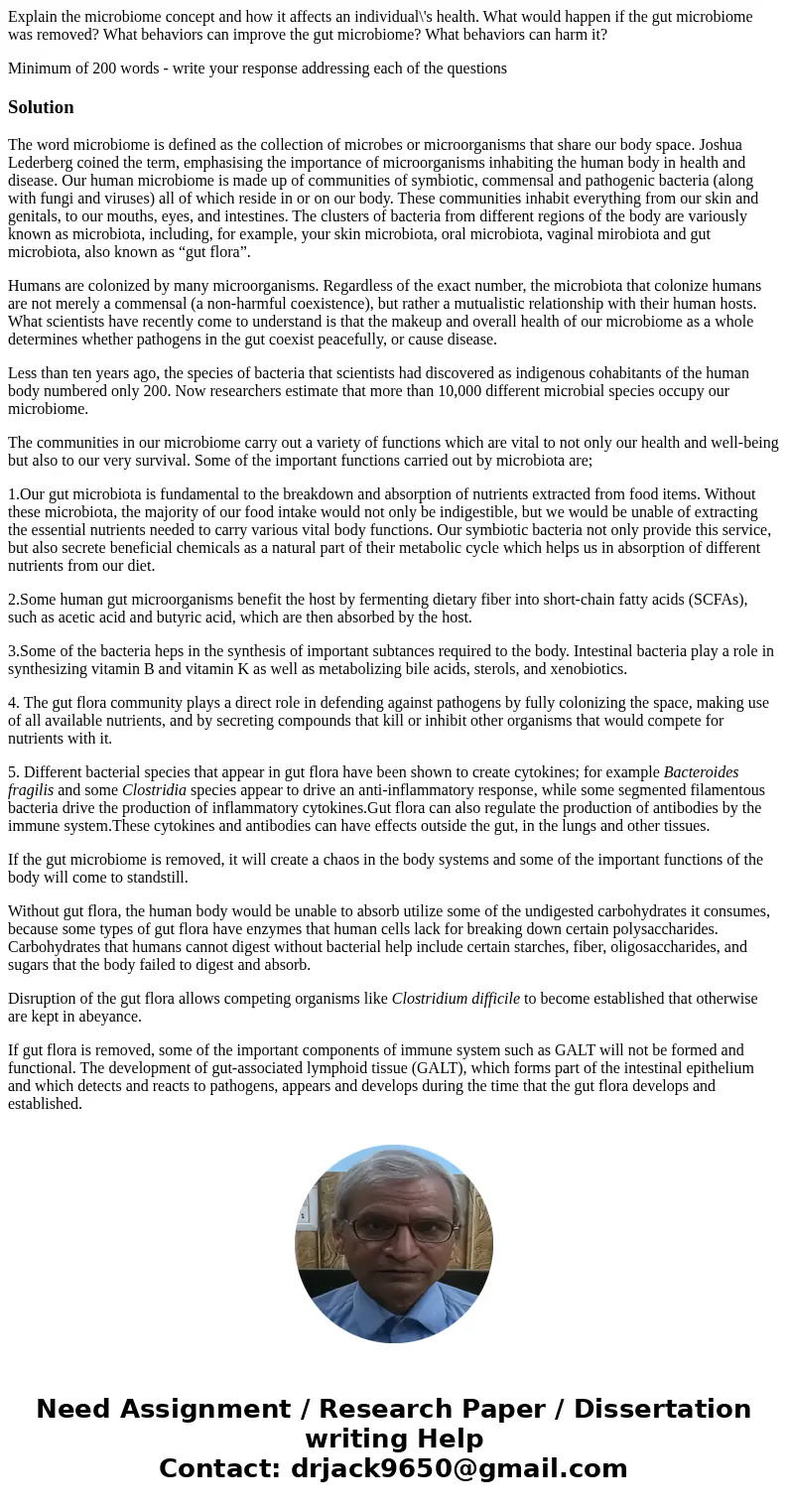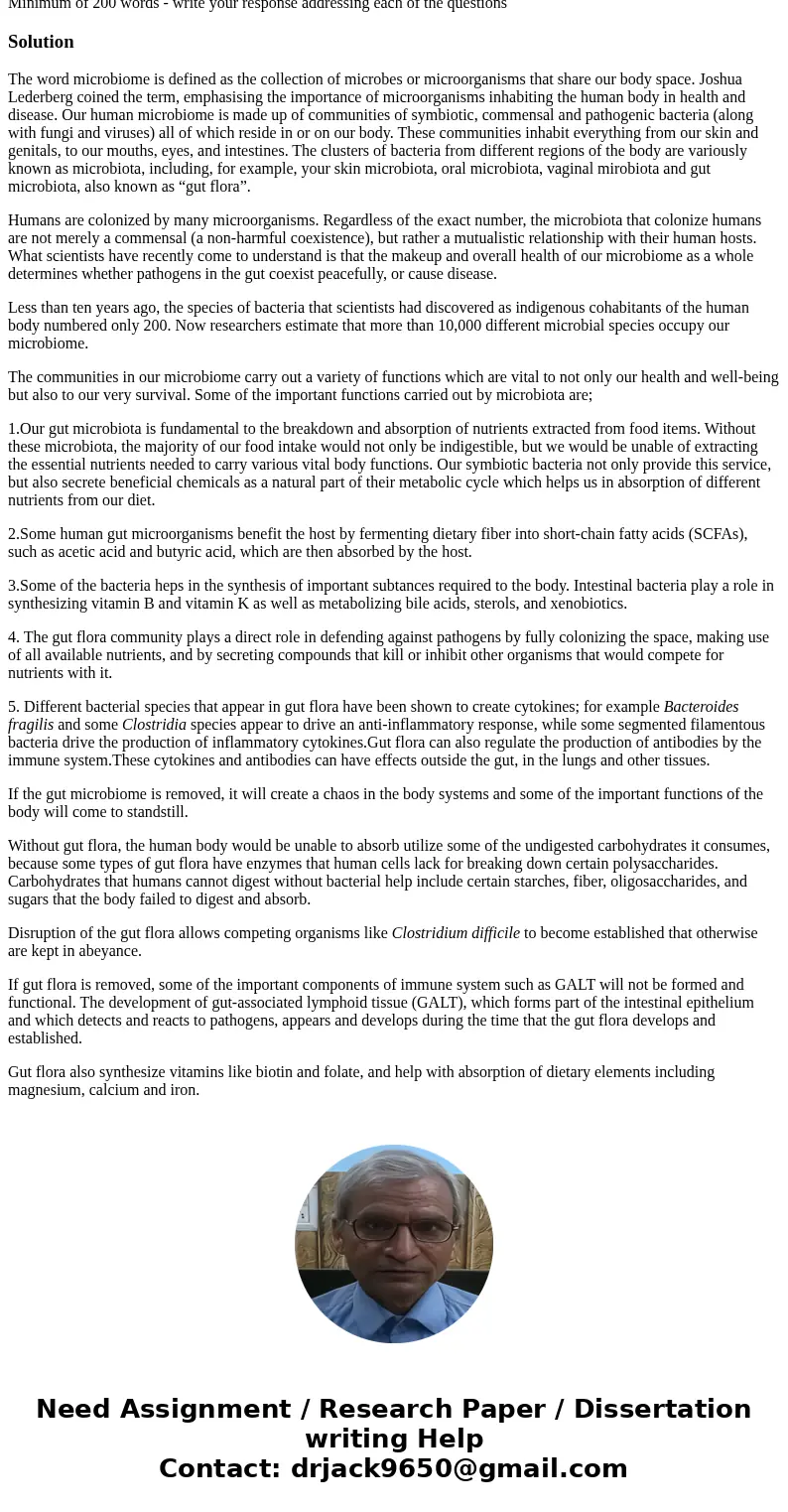Explain the microbiome concept and how it affects an individ
Explain the microbiome concept and how it affects an individual\'s health. What would happen if the gut microbiome was removed? What behaviors can improve the gut microbiome? What behaviors can harm it?
Minimum of 200 words - write your response addressing each of the questions
Solution
The word microbiome is defined as the collection of microbes or microorganisms that share our body space. Joshua Lederberg coined the term, emphasising the importance of microorganisms inhabiting the human body in health and disease. Our human microbiome is made up of communities of symbiotic, commensal and pathogenic bacteria (along with fungi and viruses) all of which reside in or on our body. These communities inhabit everything from our skin and genitals, to our mouths, eyes, and intestines. The clusters of bacteria from different regions of the body are variously known as microbiota, including, for example, your skin microbiota, oral microbiota, vaginal mirobiota and gut microbiota, also known as “gut flora”.
Humans are colonized by many microorganisms. Regardless of the exact number, the microbiota that colonize humans are not merely a commensal (a non-harmful coexistence), but rather a mutualistic relationship with their human hosts. What scientists have recently come to understand is that the makeup and overall health of our microbiome as a whole determines whether pathogens in the gut coexist peacefully, or cause disease.
Less than ten years ago, the species of bacteria that scientists had discovered as indigenous cohabitants of the human body numbered only 200. Now researchers estimate that more than 10,000 different microbial species occupy our microbiome.
The communities in our microbiome carry out a variety of functions which are vital to not only our health and well-being but also to our very survival. Some of the important functions carried out by microbiota are;
1.Our gut microbiota is fundamental to the breakdown and absorption of nutrients extracted from food items. Without these microbiota, the majority of our food intake would not only be indigestible, but we would be unable of extracting the essential nutrients needed to carry various vital body functions. Our symbiotic bacteria not only provide this service, but also secrete beneficial chemicals as a natural part of their metabolic cycle which helps us in absorption of different nutrients from our diet.
2.Some human gut microorganisms benefit the host by fermenting dietary fiber into short-chain fatty acids (SCFAs), such as acetic acid and butyric acid, which are then absorbed by the host.
3.Some of the bacteria heps in the synthesis of important subtances required to the body. Intestinal bacteria play a role in synthesizing vitamin B and vitamin K as well as metabolizing bile acids, sterols, and xenobiotics.
4. The gut flora community plays a direct role in defending against pathogens by fully colonizing the space, making use of all available nutrients, and by secreting compounds that kill or inhibit other organisms that would compete for nutrients with it.
5. Different bacterial species that appear in gut flora have been shown to create cytokines; for example Bacteroides fragilis and some Clostridia species appear to drive an anti-inflammatory response, while some segmented filamentous bacteria drive the production of inflammatory cytokines.Gut flora can also regulate the production of antibodies by the immune system.These cytokines and antibodies can have effects outside the gut, in the lungs and other tissues.
If the gut microbiome is removed, it will create a chaos in the body systems and some of the important functions of the body will come to standstill.
Without gut flora, the human body would be unable to absorb utilize some of the undigested carbohydrates it consumes, because some types of gut flora have enzymes that human cells lack for breaking down certain polysaccharides. Carbohydrates that humans cannot digest without bacterial help include certain starches, fiber, oligosaccharides, and sugars that the body failed to digest and absorb.
Disruption of the gut flora allows competing organisms like Clostridium difficile to become established that otherwise are kept in abeyance.
If gut flora is removed, some of the important components of immune system such as GALT will not be formed and functional. The development of gut-associated lymphoid tissue (GALT), which forms part of the intestinal epithelium and which detects and reacts to pathogens, appears and develops during the time that the gut flora develops and established.
Gut flora also synthesize vitamins like biotin and folate, and help with absorption of dietary elements including magnesium, calcium and iron.


 Homework Sourse
Homework Sourse